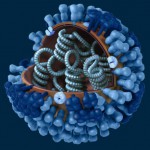 As this past flu season showed, determining exactly which strains of influenza virus to include in the annual flu vaccine can be tricky. And with influenza’s high infection and death rate and its ability to mutate, these decisions can be life or death.
As this past flu season showed, determining exactly which strains of influenza virus to include in the annual flu vaccine can be tricky. And with influenza’s high infection and death rate and its ability to mutate, these decisions can be life or death.
Looking for a way to speed up the process to know exactly what influenza viruses are circulating, the Centers for Disease Control and Prevention (CDC) is funding a 3-year project at the Wisconsin State Laboratory of Hygiene (WSLH) to pilot Next Generation whole genome sequencing of influenza viruses submitted for surveillance from Wisconsin and other states.
The WSLH is the first state public health laboratory in the country to collaborate with the CDC on this cutting-edge technology. The WSLH has been 1 of 3 CDC-designated Influenza Reference Public Health Labs since 2009.
Genetic characterization of influenza viruses is important both for monitoring genetic drift (how the virus may be changing) and for selecting the virus strains to include in influenza vaccines. Next Generation Sequencing (NGS) in state public health laboratories could potentially shave months off the process.
CDC staff recently spent two weeks at the WSLH training virology laboratory staff on the new technology and working with IT staff to establish a secure data pipeline to CDC that can handle the large amounts of data that is generated from sequencing.
